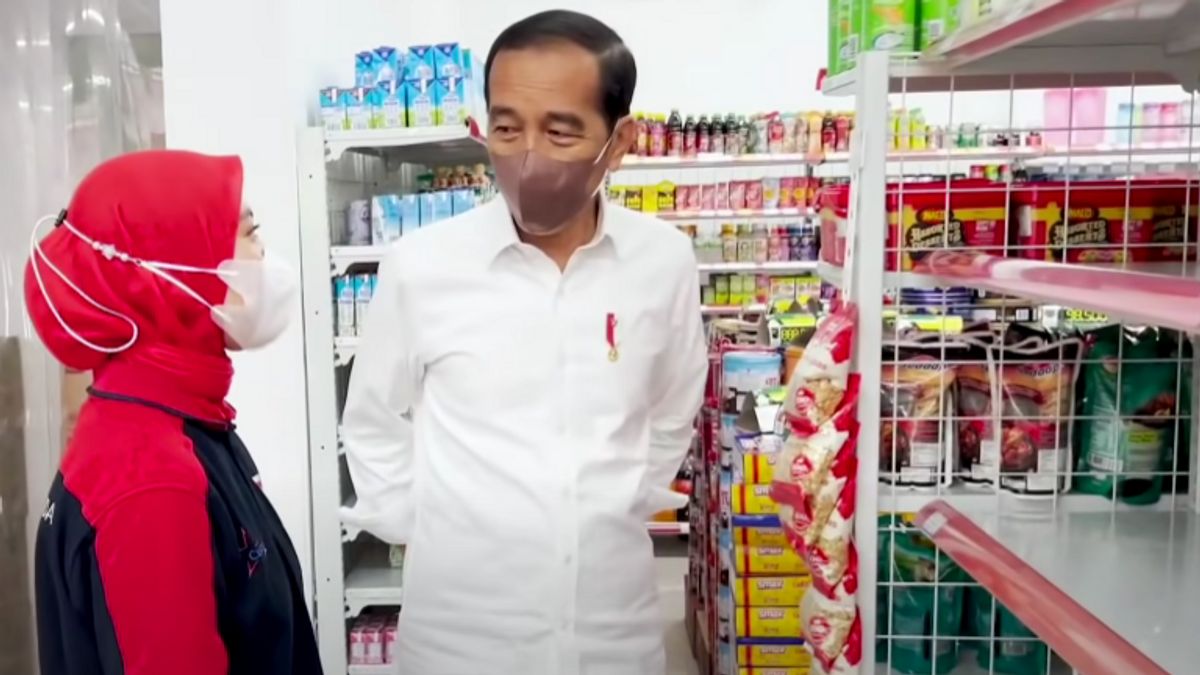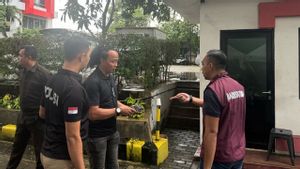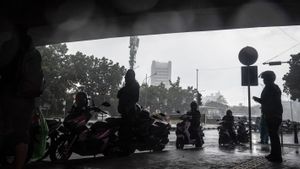JAKARTA - Sunday, March 13 at 09.05 WIB at the Flower Market, Yogyakarta. The Alfamart waiter at the place was surprised by a figure in a white shirt who suddenly entered the store. He is President Jokowi.
Jokowi is not without an agenda into it. He wanted to directly check the availability of cooking oil at a number of market locations and supermarkets, which had been a problem for months.
In various places, people screamed. They complained about the difficulty of getting cooking oil. If anything, the price could be unreasonable.
In almost many places, especially big cities, cooking oil has indeed become a rare commodity. However, according to the Ministry of Trade, the impact of rising prices and scarcity of goods is panic buying. This is because the price of affordable cooking oil makes people buy more than they need.
When he arrived at a mini market in Pasar Kembang, the President immediately walked to the cooking oil place. Sure enough, he finally saw firsthand there was no stock of cooking oil.
"Since when isn't there?" asked the President.
"Just this morning, sir," replied the minimarket guard.
Indeed, in similar shops, cooking oil can disappear in a matter of hours from the window. On average, before 14.00 WIB, it is almost certain that the presence of cooking oil will no longer be found.
The President also asked the selling price of the cooking oil. "For two liters, it is Rp. 28,000, but for one liter, it is Rp. 14,000," said the minimarket guard.
"But when will you come again?" asked the President.
"You don't have to, sir," said the shopkeeper.
In addition to visiting supermarkets, the President also directly checked the availability of cooking oil at traders in Beringharjo Market and Sentul Market, Yogyakarta. In both markets, the President found prices that varied, ranging from Rp. 14,000 per liter to Rp. 20,000 per liter.
However, the high price of cooking oil also does not guarantee the availability of stock. "The goods are there, but they are expensive," said the President, commenting on the high price of cooking oil. "There is but it's slow, sir, when it's finished it will take a long time," said the merchant.
Another problem is that there is no definite schedule for the delivery of cooking oil to traders and supermarkets. The President did not hear a definite answer when the cooking oil would be delivered. Almost all of the merchants answered that they did not know when the next shipment would be.
"Yes, you don't have to, sir, it can be every three days," said one of the traders met by the President.
Separately, Cabinet Secretary Pramono Anung in his press statement in Balikpapan said that direct checks carried out by President Jokowi were a norm when in the region, including the matter of cooking oil.
"In principle, Mr. President, in every visit to the region, he must also carry out inspections to see problems related to cooking oil and he understands this very well," said Pramono.
Furthermore, Pramono explained that the President will soon decide on the steps the government will take in the near future regarding the cooking oil. The Head of State will also soon hold a meeting with his staff after the event in the National Capital (IKN) of the Archipelago.
"This cannot be allowed to remain for too long, so it is planned that after returning from this IKN event, the President will hold an internal meeting to immediately decide on issues related to this cooking oil," he explained.
Cooking oil is rare in a country that is the largest palm oil producer in the worldIndeed, the scarcity of cooking oil is beyond logic. Just imagine, there is a commitment from CPO producers which reaches 351 million liters for 14 days, while the demand in the country for per month ranges from 279 to 300 million liters. Meanwhile, the export of CPO (Crude Palm Oil) is prohibited. That is logically more than enough.
Then, data from the Ministry of Agriculture in 2019, the total area of oil palm in Indonesia reached 16.38 million hectares spread over 26 provinces. The Indonesian Palm Oil Association (Gapki) noted that crude palm oil production in 2021 reached 46.88 million tons. Indeed, down 0.31 percent from the 2020 achievement of 47.03 million tons. But still big enough.
Even from the data obtained, since 2006, Indonesia has been ranked first and has become the king of the largest palm oil producer in the world. In 2019, palm oil production in Indonesia has penetrated 43.5 million tons, with an average annual growth of 3.61 percent.
Imagine! How ironic, cooking oil is scarce in the largest palm oil producing country in the world.
From the initial findings of the Business Competition Supervisory Commission (KPPU), the scarcity of cooking oil is allegedly influenced by several factors, ranging from 'panic buying' to problems in distribution.
The head of the National Police's Food Task Force Inspector General Helmy Santika in the media admitted that the results of field observations were indeed a shortage of cooking oil. It happened because of the business actors. According to Helmy, the price of cooking oil rose due to the actions of business actors to hold stock. They took this action because they bought cooking oil at the old price, which was more expensive than the government's benchmark, which was only Rp. 14 thousand per liter.
The English, Chinese, Japanese, Arabic, and French versions are automatically generated by the AI. So there may still be inaccuracies in translating, please always see Indonesian as our main language. (system supported by DigitalSiber.id)








